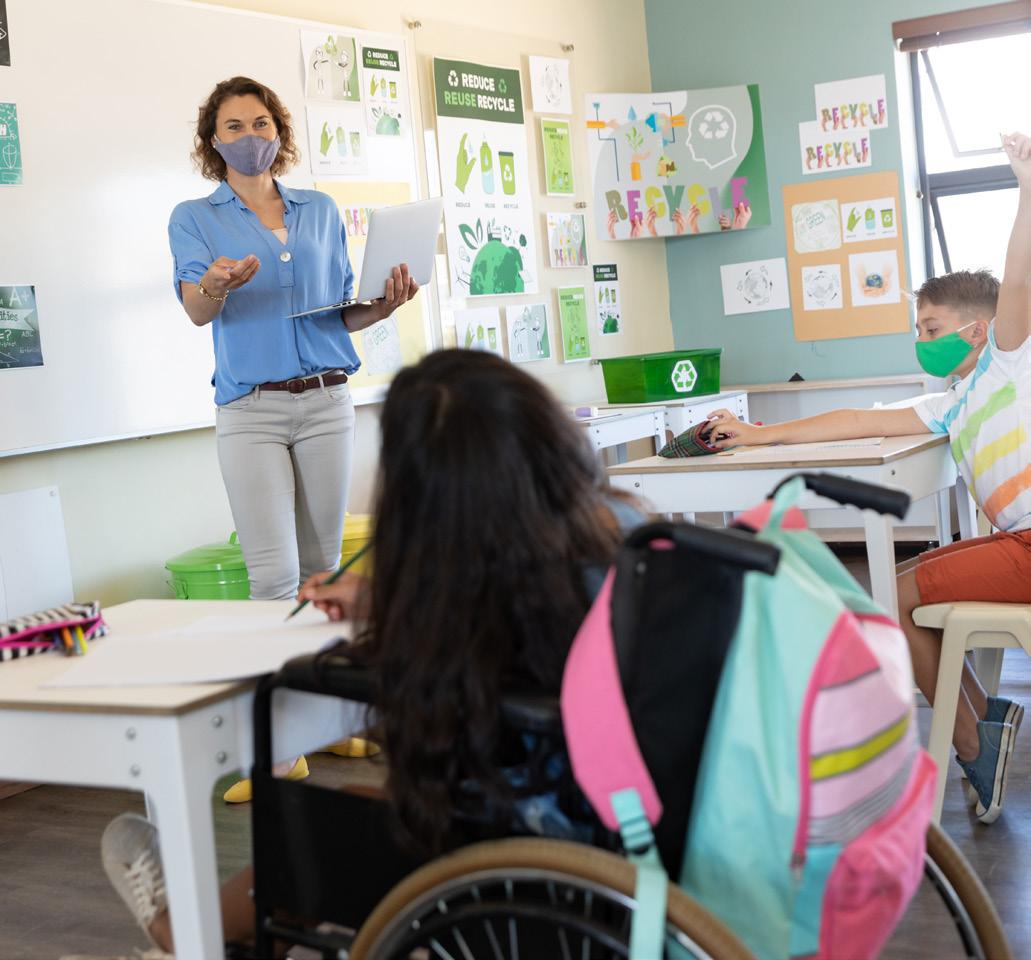
6 minute read
2021 CCM State Legislative Program
State sets foundation for growth in our towns and cities
The 2021 CCM State Legislative Program was always going to have two tasks: set the foundation for building strong and sustainable communities, while also aiding the continued response to the COVID-19 pandemic. Developed, vetted, and approved by member municipal leaders, we are ready to work with the Governor and General Assembly to address these most pressing issues throughout 2021.
Education
School has been different since March of 2020, but many of our concerns have been consistent for years.
First and foremost, municipalities deserve stability and predictability from the state. This overarching goal covers many of our recommendations. In special education we argue that funding should follow a student until said student changes school districts. In this manner, the priority, the education of the child, would be funded no matter where the student moved, no matter their needs. Because of the minimum budget requirement (MBR), moving from school to school can swing budgets dramatically, and causing undue burdens on the schools finances. Making the child the priority is the right thing to do.
In single and regional school districts, this is important at the macro level. In the former, establishing a cap on the per pupil tuition endowed academies and magnet schools are allowed to charge local governments would greatly benefit local governments who will know that there are no unknown costs. For regional boards, establishing a 3-5 year moving average to identify and establish operating costs would smooth out uncertainties and make budgeting more predictable and stable.
Energy & Environmental Management
The environment is a major issue for towns and cities in 2021, working with Sustainable CT we have given the tools to municipalities to make those changes at home. But the state also needs to back up those efforts we have already started.
In order to allow for greater green energy growth, the state should eliminate the Virtual Net Metering Credit Cap, and once eliminated, provide preferential consideration for projects proposed to be placed on “preferred” sites.
We’d also like a study of Community Choice Aggregation (CCA) programs that allows local governments to procure wholesale electricity for retail customers within their jurisdiction on a combined basis. Currently, municipal aggregation has gone nowhere because it is an opt-in program, whereas a CCA is opt-out.
Labor Relations
Some of the key highlights are to remove barriers to shared services. Many towns and cities have begun looking for ways to save money, working towards a more efficient future for our local governments, but have been prevented by collective bargaining agreements.
There also needs to be movement to help prevent unreasonably contested workers’ compensation claims. Allowing municipal employers a 45-day period to review claims and allowing them to maintain the ability to appeal would aid municipalities greatly, while preserving the rights of employees.
Land Use, Housing, and Community Development
It’s clearer now in light of the pandemic that the course of daily business has shifted from in-person meetings and visits to town halls to a predominantly electronic means of conducting business. It is likely that municipalities will not revert back to the old “normal” once this is over and will continue to operate as they have during the pandemic, adopting new technologies and processes.
One key way to adapt to this “new normal” is to remove the unfunded mandate of putting legal notices in newspapers. Not only is this a financial burden, but newspapers themselves are by and large a digital first medium. A town or city website is a crucial nexus of information for residents, and state law should recognize this. Also, there is overwhelming evidence that residents go to municipal websites first to learn about public meetings and to participate at the local level.

Municipal Law, Liability, and Insurance
In continuing with this theme, we believe that municipalities would prefer to continue conducting virtual meetings. Studies have shown that there has been a greater input from citizens as they are able to simply log in to these meetings from the comfort of their own home. In order to do this, we need the state to modify existing Freedom of Information statute/ regulation to allow municipalities this option, but it should not be mandated.
Public Health and Human Services
If one thing has been clear, it’s the utility of our local public health departments, whether an individual town or a district, these departments have literally been lifesavers over the past year. We need to make sure that we continue to work to provide them with full and adequate funding in order to preserve current services and continue the fight against COVID-19’s lingering effects. Many of these costs are likely to be reoccurring and it is important that local public health districts have the resources necessary to carry out their obligations and responsibilities. We also need to establish a legislative working group that is tasked with studying the mental health and substance abuse effects of COVID-19. This has taken a toll on us all, and there needs to be a set of recommendations for the legislature to consider during this session that will allow us to move forward.
Public Safety
The way we conduct public safety in this state has been up for debate since the passing of a Police Accountability bill last year. What isn’t up for debate is the necessity of the men and women who keep us safe.
With proper funding for the Resident State Trooper program and the Connecticut Regional Fire Schools, we can reassert the value of safety in our state. And we should be creating a statewide career development program to encourage and assist people of color to pursue careers in law enforcement and paramedicine.
Taxes & Finance
Our overreliance on the property tax has not been solved, and talks about how to solve this issue have stagnated for years. CCM’s proposals include an option to diversify revenue sources. By allowing municipalities the option to establish and assess user fees for public services provided to tax-exempt properties and assessing fees on telecommunications and electric distribution companies that use the public right-of-way, we can prevent or mitigate property tax increases.
Another proposal is to make the Municipal Employee Retirement System (MERS) mirror the State Employee Retirement System (SERS). Recognizing that additional tiers were good and necessary for the state system, it should follow that MERS could benefit from the same structure.
Transportation and Infrastructure
Infrastructure funding has been reliably unreliable with Town Aid Road grants being released late a handful of times in recent history. Maintaining current funding for these programs is crucial and key to keeping our town and city roads safe.
Another measure that will increase safety in our cities is allowing municipalities to utilize photographic traffic enforcement technology, and increasing funding for measure to increase accessibility for bicyclists and pedestrians through programs like the Community Connectivity Grant Program.
And we need to not just maintain but to expand and improve the other superhighway – the internet. Broadband access is a crucial part of our world today and this past year has proved the need to get good, quality internet access to residents at a fair cost regardless of whether or not you live in an urban center or rural area.
As always, CCM will be at the front of all actions to ensure adequate levels of state aid for towns, fighting against unfunded state mandates, supporting regional service sharing and encouraging the legislature to “do no harm.” Rest assured the voice of municipalities will be heard and we will be at the forefront of policy discussions as the 2021 legislative session progresses.







